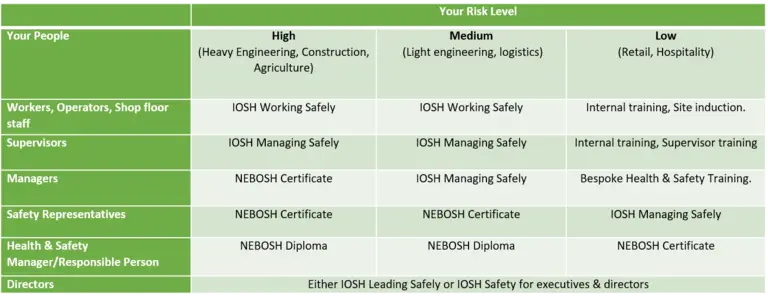It is the HSE who will judge whether your employees are competent or not when it comes to risk assessment & other EHS management activities. If they visit you, either on a surveillance visit or following an accident, one of their first questions will be about competency & training. We therefore thought we would try & provide some insight into how they make that judgement.
The HSE say that training is required to:
- ensure that people who work for you know how to work safely and without risks to health;
- develop a positive health and safety culture, where safe and healthy working becomes second nature to everyone;
- meet your legal duty to protect the health and safety of your employees.
They also say that effective training:
- will contribute towards making your employees competent in health and safety;
- can help your business avoid the distress that accidents and ill health cause;
- can help you avoid the financial costs of accidents and occupational ill health, such as damaged products, lost production and demotivated staff.
So with risk assessment, that means you cannot just send your employees on a generic risk assessment course, tick a box & forget about it. By definition, the activity must include training & experience.
But competency goes further than just risk assessment, in fact the need to make someone competent may well be a control measure that comes out of your assessment. So, let’s refer to the HSE again. The HSE also provide guidance on what training different levels of employees require (Directors, Managers, Supervisors, Workers & Contractors) they suggest:
For you - Whether you are an employer or self-employed, are you sure that you’re up to date with how to identify the hazards and control the risks from your work? Do you know how to get help – from your trade association, your local Chamber of Commerce, or your health and safety enforcing authority? Do you know what you have to do about consulting your employees, or their representatives, on health and safety issues? If not, you would probably benefit from some training.
For your managers and supervisors - If you employ managers or supervisors they need to know what you expect from them in terms of health and safety, and how you expect them to deliver. They need to understand your health and safety policy, where they fit in, and how you want health and safety managed. They may also need training in the specific hazards of your processes and how you expect the risks to be controlled.
For your employees - Everyone who works for you, including self-employed people, needs to know how to work safely and without risks to health. Like your supervisors, they need to know about your health and safety policy, your arrangements for implementing it, and the part they play. They also need to know how they can raise any health and safety concerns with you.
For contractors and self-employed people who may be working for you - Remember, these people might not be familiar with your working environment and safety systems that you have put in place for regular employees.
Thanks to how we’re structured, we are massively influenced by our membership & what they need, so we have sought to provide clear guidance on what’s required. The guidance is based on our experience with our membership which includes large multinationals & SMEs.
This, as with the HSE document is just a guide, but the Make UK version seeks to add another axis to the normal calculation & that’s Risk. We believe that risk level, rather than size of the business should help you determine what you need to provide.

How can we help
We provide a range of relevant training courses:
IOSH Courses
NEBOSH Courses
We also provide a practical solutions, support and insight around Risk Assessments. Find out more>
